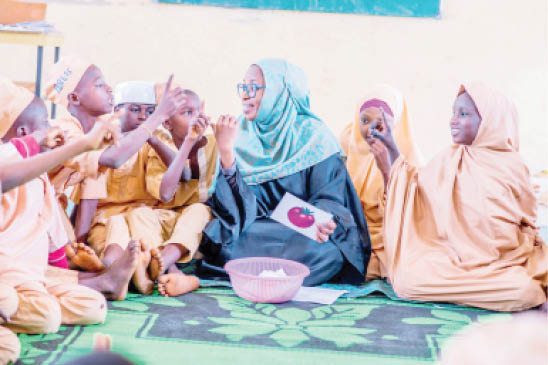The British Council has concluded the Kano Literacy and Maths Accelerator (KaLMA) programme by empowering over 30,000 students.
The KaLMA programme, funded through UK Aid, aims to improve literacy and numeracy among primary four to primary six pupils by piloting the Teaching at the Right Level approach in Kano State, Nigeria.
The programme results were made known at a dissemination event held in Abuja.
The dissemination event was a culmination of activities carried out during the course of the pilot and aimed to inform stakeholders of key achievements, deliverables and lessons learnt.
The development director at the British High Commission in Abuja, Dr Christopher Pycroft, was proud of what the KaLMA has achieved.
Dr Pycroft said, “The legacy of its achievements will live long, especially now that the Kano State Universal Basic Education Board (SUBEB) has committed to sustaining and embedding accelerated learning in Kano State education plans. The programme’s composition, execution and achievements all stand out as a model of partnership and collaboration.
“This is in no small part down to the fantastic delivery partners, such as the Kano State Universal Basic Education Board (SUBEB), the British Council and TaRL Africa, who were critical to KaLMA’s success.
“I look forward to the UK supporting many more opportunities like this to make a real tangible positive difference to the lives and futures of girls and boys in Kano and across education in Nigeria.”
The programme was funded by FCDO Nigeria and led by the Kano SUBEB in partnership with the British Council, TaRL Africa, the Sa’adatu Rimi College of Education and the Kano State Ministry of Education.
The British Council said the programme also piloted two innovations: student- teacher facilitation and a dual language approach to English learning. The dual-language approach to foundational skills in English deploys the children’s home language to assist their learning of an additional one. In KaLMA, Hausa is used as a bridge to learning English.
Also, the Council said the pilot was put on hold from April to December 2020 due to COVID-19-related school closures, while educators were also supported during school closures with continuing professional development (CPD) delivered via WhatsApp, text messages, and AVM in Maths and English.
The Strengthening Teachers English Proficiency (STEP) materials, developed by the British Council were deployed for the English CPD for their contextual relevance.
The FCDO Nigeria initiated the KaLMA programme to demonstrate and introduce trial approaches on effective teaching and learning practices to raise learning levels, particularly in the upper primary grades, through a government-led scalable and sustainable accelerated learning model, which reached over 30,000 pupils and 181 schools.
The results, according to the Council, were encouraging with significant learning gains recorded for all three subject areas based on teacher assessment data. English recorded a 39 per cent increase in the proportion of pupils who can recognise short familiar words in English, while Hausa and Maths each recorded an 18 per cent point increase in the proportion of children able to read Hausa paragraph or doing a simple subtraction problem respectively. In addition, an impact evaluation finds a relatively large and statistically significant impact on children’s outcomes in Maths. Following these positive learning gains, the Kano SUBEB has indicated that they intend to scale up the programme in at least two new local government areas.

 Join Daily Trust WhatsApp Community For Quick Access To News and Happenings Around You.
Join Daily Trust WhatsApp Community For Quick Access To News and Happenings Around You.
